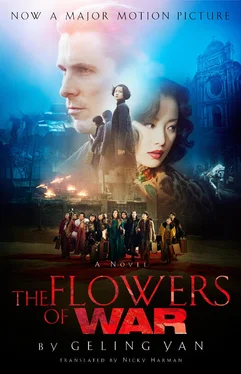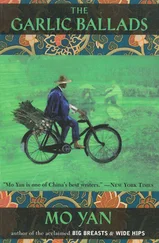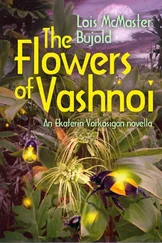The rice had just been harvested and there were plenty of straw stacks to hide in. At nightfall he sneaked back to his Chinese granny’s thatched hut and pulled down some dried water chestnuts and rice cakes which she stored by hanging them under the eaves. These he took back to the straw stack to eat. The old woman had a dozen or so speckled ducks and Fabio knew exactly where they laid their eggs. He supplemented the chestnuts and rice cakes by going to the place before she went to the river to collect the eggs, stealing a couple, cracking them open and eating them raw. She complained that her things went missing and that someone was stealing them, but she knew perfectly well who it was. Why should an old widow like her not be a bit selfish? She wanted to hang on to Fabio.
His grandmother sorted out her daughter and son-in-law’s possessions, and sold off their furniture and clothing. Then she waited in vain for Fabio to come back. Finally, she could not bear village food, houses, toilets and mosquitoes any more and gave up the idea of taking her grandson home with her. She asked the clan head in the village to tell the Chinese teacher in the local town that as soon as Fabio was found he should write to her in English and she would come back and collect him. But Fabio’s grandmother never received any further news of her grandson from the village.
When Fabio grew up, he came secretly to regret his youthful intransigence but that was after he had been taken in as a seminarist by Father Engelmann. When his American grandmother left, his Chinese granny had thrown herself and Fabio on the mercy of one of her distant relatives. The man was a friend of Fabio’s parents and had introduced his granny to them so she could help around the house and with the boy. Now he took in Fabio’s granny to do the laundry and cleaning and brought the boy up with his own children. When Fabio, at seventeen, graduated from the missionary middle school, Father Engelmann happened to be there lecturing. The priest was intrigued by this young man, who talked and behaved like a Chinese but had the body of a Westerner, and made a point of talking to him. When he left Yangzhou to return to Nanking, it was Fabio Adornato who carried his baggage for him because, from the moment Father Engelmann had stepped down from the pulpit and come towards him with a smile on his face, Fabio knew that the reason why he had been so lonely all his young life was that he would never be Chinese. It was as much Father Engelmann’s air of refinement and calm as his eloquence and the depth of his knowledge which, within a very short time, tamed Fabio and brought him to the realisation that he did not even want to be Chinese. He also understood that Father Engelmann was drawn to him because he was a Westerner. His new mentor hinted to him that it was beneath Fabio’s dignity to continue to mix with Chinese people as a Chinese man. Father Engelmann and Fabio stood out from the crowd like a pair of camels who had met by chance in a herd of horses. It was if they had known each other for years.
When Fabio graduated from the Nanking Seminary, Father Engelmann, who did some teaching there, applied for a scholarship for his protégé so that he could continue his studies in America for a further three years. In America Fabio managed to trace his entire American family, young and old. But being with them made him so anxious, he began to itch and scratch his head frantically. He realised that he could not be an American either. The friendly chit-chat with his American relatives was just a front. The real Fabio retreated into the recesses of his heart and counted the seconds until this momentous reunion with his blood relatives could come to an end.
Fabio walked across the lawn to the rectory. When he reached Father Engelmann’s door, he knocked lightly.
‘Come in.’
Father Engelmann and Fabio were on good terms, the same good terms that they had been on since they first met, neither more intimate nor more distant. That was the kind of person Father Engelmann was. If he was your neighbour, he would greet you genially the first time with a ‘How good to meet you!’ And when you had been neighbours for decades, he would still greet you with the same ‘How good to meet you!’ He was able to freeze-frame familiarity so that it neither matured nor died.
‘Is something the matter, Fabio?’ he said now. He did not ask Fabio to sit down with his usual civility.
The priest was hunched over his short-wave radio listening to overseas broadcasts on the situation in Nanking. He glanced round at Fabio, then turned back to his radio. Fabio was silent and listened with him to the crackly broadcast. He realised it was not the moment to talk to the priest about something as trivial as women fighting over food.
He glanced at the pale rectangular and oval marks of varying sizes on the faded walls where framed pictures had once hung. When the air raids first started, Father Engelmann had made Ah Gu take the pictures down and store them in the cellar, in case the glass shattered during a raid. Fabio remembered each of the pictures even in their absence, because Father Engelmann had not changed or moved them around in decades. The vertical oval outline, the largest, was a portrait photo of his mother, taken from a tiny photo on the back of a pocket watch his father had left him, and enlarged and touched up to such an extent that it was as much a product of science as of art. Below it on the left, the rectangular shape marked where a full-length graduation photo had hung, the only evidence of Father Engelmann ever having been young. On the bottom right, the horizontal oval was where the picture of Father Engelmann with His Holiness Pope Pius XI used to hang.
‘It seems it’s true,’ Father Engelmann muttered. ‘They’ve secretly executed Chinese soldiers. The shots I heard came from the execution ground by the river. Even the Japanese reporters and the Germans were shocked.’
The gunfire had made Father Engelmann wonder whether Chinese troops were still resisting. He had been told by officials in the Safety Zone that any troops who had not had time to retreat had been taken prisoner. But the gunfire he had heard and the news from the wireless seemed to contradict this.
‘Are the Japanese really flouting international rules on the treatment of prisoners of war?’ he said to Fabio. ‘That’s an affront to all civilised, humane values. Can you believe it? Are these really the same Japanese people I know?’
‘We need to find a way to get food and water. Otherwise, by tomorrow there won’t be any drinking water,’ said Fabio.
Father Engelmann understood what Fabio was getting at: there was absolutely no sign that, within the hoped-for few days, the invading forces would stop the butchery, take control of the vanquished city and impose law and order. Moreover, the killing had become a habit, and the prospect of it stopping seemed remote. There was something else Fabio was getting at: very soon, they would all suffer the consequences of Father Engelmann’s generosity in taking in the prostitutes and allowing them to deprive the schoolgirls of their food.
‘I’ll go to the Safety Zone tomorrow and get hold of some food—potatoes, yams or whatever. If that can keep us going for another two days, at least the children won’t starve,’ Engelmann said.
‘And what about after that?’ asked Fabio. ‘And what about water?’
‘We have to take it hour by hour now! Getting through another hour is another hour of life!’
Fabio felt furious. Father Engelmann repeatedly criticised him for passive aggression, telling him that disagreements should be thrashed out openly and confrontation should be direct. That was the way almost all Americans behaved. Fabio’s passive aggression was a Chinese trait, one which he, Father Engelmann, deplored.
Читать дальше












